This is from Jacobin, a piece by Ted Nordhaus and Alex Smith:
Alice Waters, the doyenne of farm-to-table cooking, organic farming, and all things California cuisine, has long been a celebrated figure. Her brand of industry-defying, Berkeley-inspired, slow food idolatry has captured the minds of both the culinary world and many progressives. But Waters and the ideology she has been so instrumental in constructing have also clashed with many traditionally leftist goals.
That’s something some conservatives have picked up on; in 2008, philosopher John Schwenkler authored a provocative article for the American Conservative arguing that Waters’s social and political agenda ought to be embraced by the modern conservative movement.
America’s industrialized and mass-produced food system, Schwenkler argued, was a product of big government, overregulation, rent seeking, and subsidies. Water’s vision, by contrast, “binds us most fundamentally to place, family, market, and community,” representing, Schwenkler claimed, “a crucial step in the restoration of culture” and “the kinds of projects that will build community; revitalize regional economies; encourage stable, healthy families; and instill the kinds of civic attitudes that make centralized government appear burdensome.”
The essay provoked a few outraged responses on the Right and was mostly ignored by the Left. In contrast with Wendell Berry’s agrarian nostalgia, Waters’s explicitly progressive brand of food politics, tied up with “Berkeley in the ’60s” atmospherics, has never attracted much interest on the Right.
Today, Waters, due to the prolonged success of her Chez Panisse — a Berkeley mainstay for expensive, “ingredient-driven” cuisine and one of the United States’ most influential restaurants — remains highly influential. She has, however, had to contend with more pushback from her erstwhile progressive allies. Waters responded to concerns that her vision for America’s food system was elitist in the New York Times Magazine by vociferously objecting that she “cannot compromise when it comes to wholesomeness.”
I've never been a fan of Alice Waters. I've never seen the point in her frou-frou ways or attitudes.
As a chef, fine. Eat at her place if you like it. But I've never thought, "Here is a cooking genius. Here is someone who I would like to emulate in my own home." She's not Frances Moore Lappe.
This is C.I.'s "Iraq snapshot" for Monday:
Those protests are being ignored -- again -- by the western press.
The protests continue this morning. And so does violence against the protesters. AL AHMAD TV reports today:
To mark the 16 Days of Activism against Gender-Based Violence, the Civil Development Organization in Sulaymaniyah launched an event to raise awareness on violence against women. The event featured women dummies lined up in the garden, who represented victims of violence. Visitors can hear their sorrowful stories through microphones attached to those dummies. According to the latest statistics, the number of victims of violence has surged despite deterrent laws. In the last 8 months, 10 women lost their lives in an honor killing.
Why was The #MeToo movement necessary in the US? Because women's rights are given lip service from time to time but not truly honored or recognized. And that is reflected in what US news outlets choose to cover when they cover foreign countries. Certainly, THE NEW YORK TIMES' go-go boys in the Green Zone, while getting really close with Iraqi women (prostitutes) elected to ignore the women of Iraq in print. To read those early year reports is to think that Iraq had no women in the whole country. THanks for all your 'ehlp John F. Burns and Dexy. Will you ever attone for what you did? Your wrok really does qualify as a journalistic crime.
And those crimes continue to this day. The pattern set by the 'golden boys' continues. So when Iraqi women fight for their rights, the western press looks the other way. Over and over. It's really past time that women with spaces -- coumnists like you, Michelle Goldberg -- started using your space to point out how your own outlets disappear women from the coverage.
JINHA WOMEN'S NEWS AGENCY reports:
Women in Southern Kurdistan are subjected to domestic violence. They are subjected to physical, psychological, verbal, and economic violence by their fathers, husbands, brothers, and sons. Many women set themselves on fire to get rid of violence. Neşmik Resul, a psychologist working at a hospital in Sulaymaniyah spoke to our agency about what causes women to set themselves on fire.
Emphasizing that the rate of women, who set themselves on fire, shows the rate of violence against women, Neşmik Resul said, “Before, we worked on survivors, women, men, and children, of self-immolation. 30% of women living in Sulaymaniyah have set themselves on fire. Some of them died before being taken to hospital. We don’t know exactly how many women and young people have set themselves on fire until now but their number is more than we know.”
Stating that the ages of women, who set themselves on fire, are between 14-35, Neşmil Resul said, “Domestic violence and economic problems are the main reason for women to set themselves on fire. Female survivors have received psychological support at the hospital now. They tell us, ‘If there was another choice, we wouldn’t have set us on fire.’ Women set themselves on fire because they think they don’t have another choice.”
“Female survivors are subjected to more violence”
Mentioning that women are afraid of telling violence against them, Neşmil Resul said, “Women don’t report violence faced by them because they are afraid. Female survivors are subjected to more violence by their husbands. Women have no right to make their decision.
“I am ready to provide psychological support to women”
“The survivors need psychological support and I am ready to provide psychological support to them,” Neşmin Resul told us.
These are stories that mater and they are stories that the few western outlets that bother to cover Iraq now manage to regularly miss.
They certainly missed a death in the region yesterday. Khanzad Organization notes:
A police officer was killed by an armed suspect while responding to a domestic violence call late Saturday in Sulaimani according to officials. Several others were injured.
A person who was subject to a complaint clashed with police units from Sulaimani’s Directorate of Combatting Violence Against Women who were in the process of arresting him, the directorate’s media head Jamal Rasul told Rudaw following the accident.
Police officer Mohammed Latif was killed and three others were injured, he added. The alleged suspect also set the police car on fire, Rasul noted.



